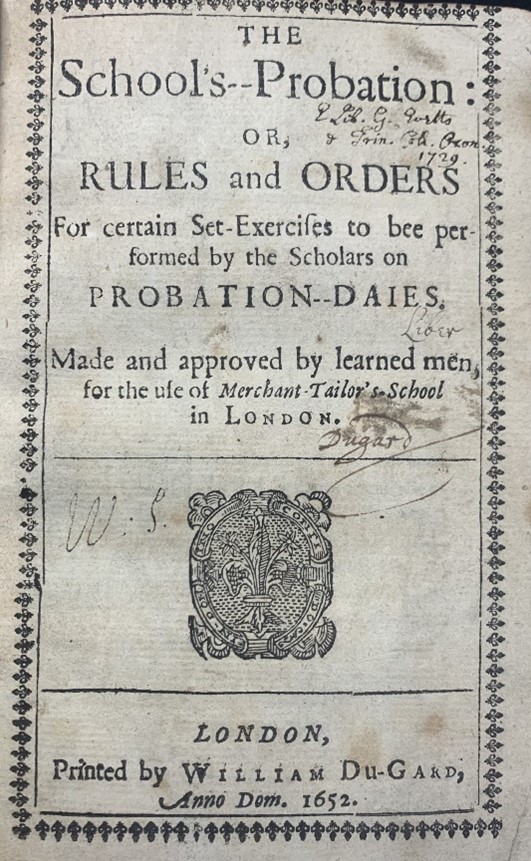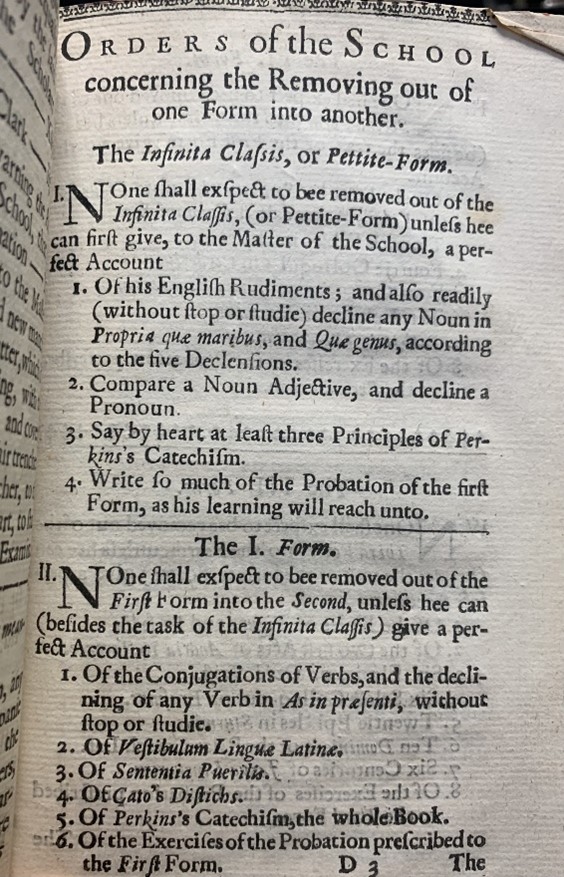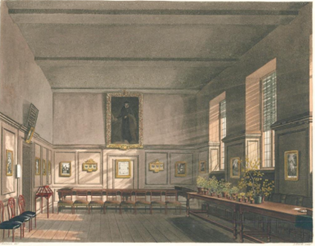Examinations and a controversial Head Master
Examinations, the curse and opportunity of every student, are never very far away at Merchant Taylors’. The Archive has many items that tell the story of the evolution of examinations and although it is not clear when the first written assessments took place, amongst the archive’s treasures is a small book dating from 1652, printed by the Merchant Taylors’ School Headmaster William Dugard, entitled:
“The School’s Probation, or Rules and Orders for certain set exercises to bee performed
by the Scholars on Probation Daies, made and approved by learned men for the use of Merchant Taylors’ School”

The term probation comes from the Latin verb probare, meaning to prove or to test and the book gives details of the tests to be given to boys to enable them to move up to the next class as well as for promotion to the positions of prompters and monitors, whose job was not simply to maintain order in the school but also to assist with the teaching of the junior boys. Promotion to the JCR was eagerly sought after as it represented a stage towards gaining admission to Oxford or Cambridge.

The examinations were held in March and October and involved the whole school. The exams were notable for the battles that followed their conclusion, with different year groups battling to reach the exit first, according to Draper:
It was followed by another conflict on the school stairs, the Fifth and Sixth occupying the landing and the lower forms attempting to storm them. Here coats and jackets were torn, ties disordered, and sometimes kicks and blows exchanged. Monitors and prompters however took no part in these undignified performances”
(Hazlett, a day boy, quoted in FW Draper’s ‘Four Centuries of Merchant Taylors’ School)

The Examination Hall at Suffolk Lane
William Dugard was a controversial figure, both in education and politically. As Master of Stamford School, he sued the corporate authorities for misappropriation of school lands and other abuses before heading on to Colchester grammar school where he was remembered not only for increasing the school roll but paying for the upkeep of the school at his own expense before being forced to resign for offending the local population.
In May 1644 he became Headmaster of Merchant Taylors’ School and in 1648 the Company invited him to be the examiner of all the schools under their authority. Whilst the School flourished under his leadership, he fell foul of the government of Oliver Cromwell in 1650. He had acquired printing presses to establish a business (hence printing the book in the School’s archive) but he printed a defence of Charles I which incensed Cromwell, leading to his presses being seized, imprisonment in Newgate prison and the Merchant Taylors’ Company being instructed to remove him from his post.
Dugard spent a month in prison before being released, possibly through the intervention of the poet John Milton who appealed on his behalf. In September 1650 returned to the post of Headmaster and remained there until, again, he was sacked in 1661 for ‘breaking orders’ which seems to have reflected a decline in school numbers whilst he focused his attention on producing more text books.
We wish all those taking examinations the best of luck and the archive suggests that life can be equally challenging for those who set them as well as those who have to sit them.